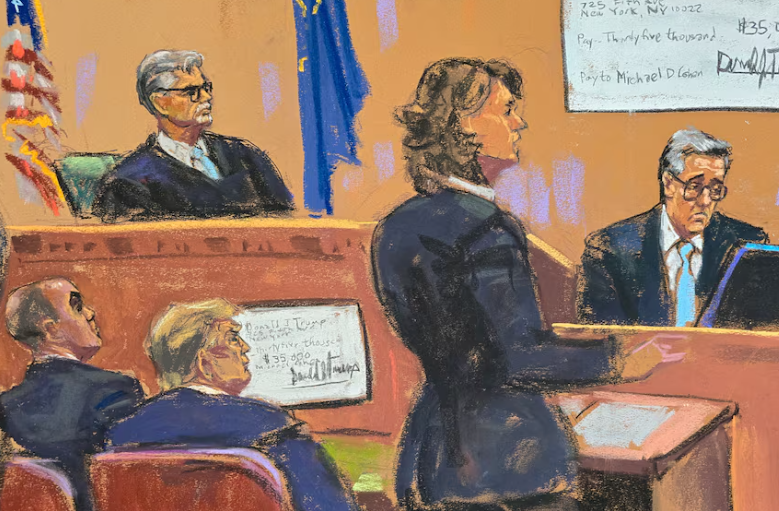On Tuesday, Donald Trump’s lawyers grilled Michael Cohen about insulting social media posts and television appearances in an attempt to undermine his testimony that Trump authorized a hush money payment to a porn star.
Trump attorney Todd Blanche aggressively questioned Cohen, who acknowledged calling the former president a “dictator douchebag” on TikTok and admitted to persisting in commenting on the case despite prosecutors’ expressed frustration.
Cohen, Trump’s former fixer and the prosecution’s star witness, spent about nine hours on the witness stand on Monday and Tuesday, providing detailed testimony that Trump ordered him to pay adult film star Stormy Daniels in 2016 to silence her about an alleged 2006 sexual encounter, fearing it would damage his presidential campaign.
However, Trump’s lawyers, aiming to discredit Cohen, focused on his checkered history – he served time in federal prison for various crimes, including the hush money payment, and confessed to lying under oath.
During cross-examination, Trump’s lawyers began showing jurors pictures of Trump-themed merchandise for sale on Cohen’s website, such as shirts featuring an illustration of Trump behind bars and mugs with the inscription, “Send him to the big house, not the White House.”
As Blanche peppered Cohen with questions, Trump occasionally exchanged notes with his lawyers before assuming his customary posture of leaning back with his eyes closed. At one point, his mouth appeared to hang slack for a moment.
Claims
Cohen’s $130,000 payment to Daniels in October 2016 lies at the heart of Trump’s historic trial, now in its fifth week. Prosecutors allege that Trump reimbursed Cohen after the election by creating false records indicating they were for legal fees, forming the basis for the 34 counts of falsifying business records that Trump faces.
Trump, 77, the 2024 Republican presidential candidate, has pleaded not guilty and denies any sexual encounter with Daniels. He has portrayed the case as a partisan attempt to interfere with his campaign to reclaim the White House he lost in 2020 to Democratic President Joe Biden.
Earlier on Tuesday, Cohen described an Oval Office meeting in February 2017 where Trump informed him that he would soon receive the first monthly installments of a bonus package, including reimbursements for the Daniels payment.
Prosecutor Susan Hoffinger guided Cohen through a series of invoices and checks, some signed by Trump himself, which Cohen claimed were falsely marked as payments for legal services. Cohen admitted that there was no retainer agreement.
Cohen, 57, admitted to lying multiple times to Congress during an investigation into Trump’s Russia ties, eventually pleading guilty to perjury. He also confessed to repeatedly lying about the payment to Daniels, initially telling journalists that Trump had no involvement.
FBI Raid
In 2018, when the Justice Department began investigating the Daniels payment, FBI agents raided Cohen’s home. He said he called Trump in a panic, and although Trump reassured him, it was the last time they spoke directly. Instead, Cohen testified that a lawyer close to Trump adviser Rudy Giuliani offered a “back channel” to Trump.
Meanwhile, Trump defended Cohen on social media and denounced the idea that Cohen might cooperate with prosecutors, constituting what Cohen described as a “pressure campaign” to keep him in line. However, he eventually decided to cooperate after consulting with his family.
Cohen pleaded guilty to federal crimes in 2018, including offenses related to the Daniels payment, and said he was acting at Trump’s behest, though Trump was not charged.
During the trial, U.S. House Speaker Mike Johnson joined Trump, criticizing the case outside the court. While Cohen testified, a mid-level appeals court rejected Trump’s latest attempt to throw out a gag order that Trump claimed violated his right to free speech.
On Monday, Cohen testified that Trump approved multiple payments to suppress damaging sex-scandal stories. Cohen recalled Trump expressing concern about the impact of Daniels’ story on his White House bid, rather than on his family, as Trump’s lawyers suggested. This distinction is crucial to the prosecution’s case.
Under New York law, falsifying business records can be elevated from a misdemeanor to a felony if the crime helped conceal another offense. Prosecutors argue that the payment was effectively a secret campaign contribution, violating federal and state laws.
The Manhattan trial is considered less consequential than three other criminal prosecutions Trump faces, all of which are mired in delays. These cases charge Trump with attempting to overturn his 2020 presidential defeat and mishandling classified documents after leaving office. Trump pleaded not guilty to all three.

